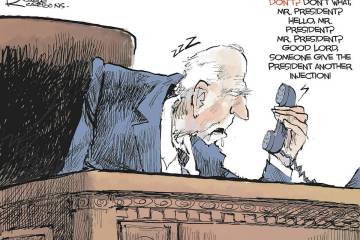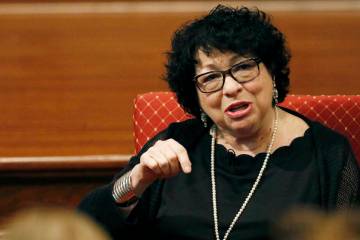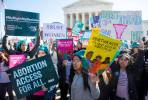COMMENTARY:
The extent to which Roe v. Wade has come to dominate American politics can be found in the anguished cries that followed the announcement of Justice Anthony Kennedy’s retirement from the Supreme Court. There are other issues that people care about, but Roe forms the centerpiece of any discussion about what a post-Kennedy court might look like.
I am myself uneasily pro-choice. Moreover, just a few days ago, I argued that the bitter judicial wars tearing apart today’s politics can be ended only with more judicial deference to legislatures and to precedent. It stands to reason that I would be dismayed by the politically electrifying prospect that Roe might be overruled entirely. But I wouldn’t be dismayed. I’d be glad to see Roe go, as quickly as possible.
How can someone who calls herself pro-choice oppose Roe v. Wade? Let me count the ways.
The decision itself is a poorly reasoned mess. It failed to mount a convincing case that the Constitution contains language that can be read as guaranteeing a woman’s right to abort her pregnancy. Nor have the subsequent courts that amended and extended Roe managed to come up with a constitutional justification; it’s all “emanations and penumbras” and similarly float-y language that did little to convince opponents that Roe v. Wade was a good or necessary ruling. Even many liberal supporters of a constitutional right to abortion have voiced concerns about the way the Burger court got us there; those critics include Justice Ruth Bader Ginsburg.
That poor drafting quasi-accidentally left America with some of the most permissive abortion laws in the world, far beyond what most legislatures would permit if the matter were open to debate. Today, the United States is one of only a handful of countries to allow elective abortions after the 20th week.
And that, in turn, is the biggest problem with Roe: It has given the most religious-developed country in the world one of the world’s most permissive abortion laws. This is not some peculiar quirk of the American political psyche. The abortion law is out of step with what the majority of the population wants, and given the seriousness of what’s involved, it is Roe, more than any other opinion, that is driving both the radicalization and the judicialization of American politics, as pro-lifers fight like caged tigers to amend the law through the only avenue left open to them.
It might have been reasonable at some point to hope that eventually pro-lifers would accept that Roe is, as liberals are fond of saying, “settled law” and move on to another issue. Nearly 50 years in, however, that hope is borderline delusional. Public sentiment on abortion has changed surprisingly little since the 1970s. One might even argue that Roe has frozen American politics in a sort of a time warp because for almost five decades no one has had to do the hard work of specifying when, and under what conditions, abortion should be legal.
With the Supreme Court having, in effect, written abortion law covering the first two trimesters of pregnancy, offering an opinion about abortion is costless. Pro-lifers can say that abortion ought to be outlawed even in cases of rape and incest, knowing full well that they’ll never have to look a rape victim in the face and explain why she had to carry her attacker’s baby to term. Pro-choice advocates, meanwhile, don’t have to directly advocate allowing second-trimester abortions; the Supreme Court removed that burden. No wonder abortion politics are so polarized and poisonous.
Somewhat paradoxically, the way to make abortion less contentious is to throw the matter back to the states so that people can argue about it. Debating the difficult decisions regarding gestational age and circumstances would force people to confront the hard questions that abortion entails, which has a moderating effect on extreme opinions.
Returning the matter to the states would give most people a law they can live with, defusing the rage that permeates politics and has more than once culminated terrorism against abortion doctors.
If you’re pro-choice, it’s probably hard to swallow the idea of “permissive in New York and illegal in Alabama”; you’d much prefer to keep the status quo. But that’s politics: Both sides settling for less than what they want. The alternative is for one side to seek total victory in a total war. That’s not an alternative you should endorse unless you’re surer than any American can be that your side will be the one that ultimately wins the war. After all, Roe once seemed like total, permanent victory. Not anymore.
Megan McArdle is a Washington Post columnist and the author of “The Up Side of Down: Why Failing Well Is the Key to Success.”




























